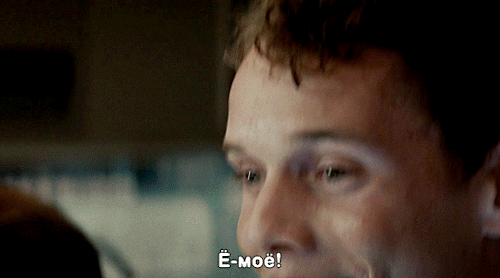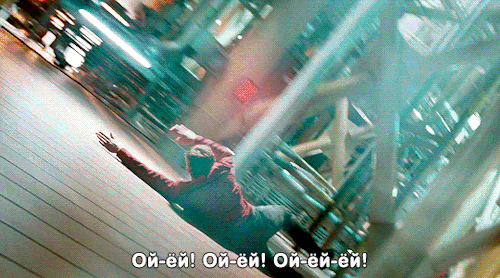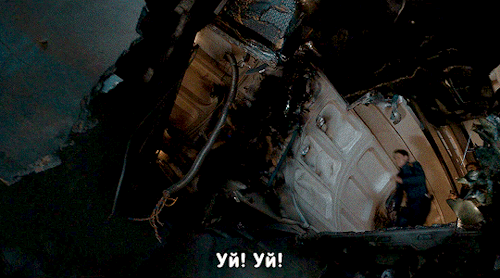Russian Idiom: как не знаю кто
Russian Idiom: как не знаю кто
Как не знаю кто often cannot be translated directly. It is an idiom meaning “to the extreme degree, too much”. “Я не знаю кто”, literally, I don’t know who, implies that any comparisons with other people or other events would be too weak, too pale. “I don’t know who could be as [something] as you are now”
Here are a few examples for you (thanks, Reverso Context) :
Эти девушки смотрели на тебя как не знаю кто. These girls have been lookin’ at you like I don’t know what.
Нет, я еду домой, вымотался как не знаю кто. No, I’m going home. I’m completely soaked.
Надевает наушники и радуется, как не знаю кто. He’s listening on his headsets, happy as a clam.
Ты пьяна как не знаю кто. You’re really drunk.
Воевали как я не знаю кто, чтобы сделать это. You have fought through hell to do so.
More Posts from Eto-ena and Others
Here's the promised translation of 'Improvisators' that I mentioned in my prevoius post! I reaaally enjoyed this one and I hope you will too!
Thank you for waiting <3
Click here for the FULL EPISODE
"Crocodile Gena" (1969) and "Cheburashka" (1971) are puppet cartoons, based on the book of Eduard Uspensky. Crocodile Gena works in a zoo as a crocodile. He is very lonely. Gena finally decides to make friends. Animals and people react to his announcement. Soon, Cheburashka comes to his place, and together they begin to do good things.
«Крокоди́л Ге́на»» (1969) и «Чебурáшка» (1971) - ку́кольные мультфи́льмы, сня́тые по моти́вам кни́ги Эдуа́рда Успе́нского. Крокоди́л Ге́на рабо́тает в зоопа́рке — крокоди́лом. Он о́чень одино́к. Наконе́ц Ге́на реша́ет завести́ себе́ друзе́й. На его объявле́ния отклика́ются зве́ри и люди. Вско́ре к нему́ прихо́дит Чебурáшка, и они́ вме́сте начина́ют де́лать до́брые дела.
Among his multiple talents, Gena plays accordion and sings. On a rainy day, which happens to be his birthday, he sings the following song:
Песня Крокодила Гены
Пусть бегут неуклюже,
Пешеходы по лужам,
А вода по асфальту рекой.
И неясно прохожим,
В этот день непогожий,
Почему я весёлый такой.
Я играю на гармошке,
У прохожих на виду,
К сожалению, день рожденья,
Только раз в году.
Прилетит вдруг волшебник,
В голубом вертолёте,
И бесплатно покажет кино,
С днём рожденья поздравит,
И, наверно, оставит,
Мне в подарок пятьсот эскимо.
Я играю на гармошке,
У прохожих на виду,
К сожалению, день рожденья,
Только раз в году.
Gena the Crocodile's Song
Never mind that the clumsy pedestrians
are jumping over rain puddles.
And that the water is streaming down the street.
And never mind that the passers-by can't make sense of
Why is it that I'm so happy on such a dreary day.
Yet I'm playing my accordion
In front of everyone on the street.
It's so sad that a birthday
Can only happen once a year.
A wizard will suddenly appear
In a blue whirlybird,
And will show me free movies.
He'll say Happy Birthday
And just before he flies away
He'll probably leave 500 ice cream cones for me.
Yet I'm playing my accordion
In front of everyone on the street.
It's so sad that a birthday
Can only happen once a year
(https://youtu.be/lUBNtYixTSs)
Russians use some phrases from this cartoon in speech:
Некоторые фразы из этого мультфильма русские используют в речи:
Мы строили, строили и наконец построили. Ура! (We built, built and finally finished. Hooray!)
Чебурашка, ты настоящий друг.(Cheburashka, you are true friend)
Опять чебурахнулся*. Ух ты, Чебурашка какой. (*ЧЕБУРÁХНУТЬСЯ - Упасть с шумом /this verb means to fall with a big noise. The name Чебурашка is derived from the verb чебурахнуться)





“There are certain things in the movie that are very Russian that is difficult for an American audience to pick up on. Like when [Kirk and Sulu] freefall and I capture them and I say something in Russian….[says Russian phrase]…it means “Oh man!” basically, which is something I ad-libbed. Which goes back to what I was saying. Chekov never speaks Russian in the series, and that was Russian slang. And that that is something I decided to add just for the hell of it, because JJ [Abrams] said ‘throw in some Russian, let’s do it for fun.’ It was just a moment that needed some kind of reaction, and they loved it out there. It is one of those things that Russian people get. I think Russian people are very happy with Chekov because he is one of the few Russian characters in American pop culture history that is not the Red Dawn kind of Russians.” — Anton Yelchin
Here's a list of great VK public pages in Russian that I adore: pt 1
If you're learning the language, I think these might help you get more familiar with not only reading and spelling, but with how Russians actually communicate. And these pages are pretty cool too, so you can just check them out even if learning the language isn't the main goal.

1. покажи нам кусочек своей жизни/show us a piece of your life
A rather cool page where people share random pictures from their phones with a bit of info about themselves. Every post has its own aesthetic but more importantly, these posts feel very real and authentic. Here's what some of these posts look like.

"I'm majoring in geo in Moscow, sing in choir, and right now I'm writing my thesis a bit worried about my future. But I'll be fine. Kindness to all"

"the life of a physics teacher 💫"

2. пушистые морды/fluffy faces
Another page that accepts post suggestions. Here you can share your adorable pet (it's mostly cats).

"his name is Oleg"


3. мам ну не читай/mom don't read it
Did you have a diary when you were a kid? I cringe every time I read my old diaries. But this page collects all the weird diary entries and posts them. Not sure where they take them from, but they're all pretty hilarious.

"the door to the future"

"the page of positivity"
I'll be back with a part two!

Дайте человеку хлеб - и он сыт весь день (Give a man bread and he's full all day long)
Дайте человеку арбуз - и он ссыт всю ночь (Give a man watermelon and he pisses all night)
There is a pun here, the two words sound absolutely the same: - сыт - is full. - ссыт - pisses This is what makes it very funny in Russian.
Vocabulary: сытый (short form: сыт, сыта, сыты) - to be full ссать - to piss (colloquial)
I was just serfing the net and came across this video. I really love old educational videos for Russian learners, so I thought I’d share it. (I don’t know why I find the last conversation so funny, but it is)
Сесть and its many meanings
Basic verbs can be surprisingly tricky. You might think the verb садиться/сесть ("to sit down") is straightforward, but it's anything but simple. Here's a dive into its multiple meanings:
To board (a bus, train, etc.):
Мы сели в автобус - We got on the bus.
To run out of battery:
У телефона села батарейка - My phone's battery is dead.
To shrink:
У меня футболка села после стирки - My T-shirt shrunk after washing.
To get imprisoned:
Он сел на пять лет - He went to prison for five years.
But that's not all! Here are some more uses:
My voice is gone, I can't speak:
У меня сел голос, я не могу говорить.
I am on a diet:
Я сел на диету.
I started a book - I want to finish it by summer:
Я села за книгу - хочу дописать к лету.
Which meaning of 'сесть' surprised you the most?
i’m a native speaker and never realized that until now omfg
In Russian we don’t say “You’re annoying”, instead we have “ты меня бесишь (ty men'a besish)”, which literally means “You’re turning me into a demon” and this is just too #relatable.
Submitted by @karl-the-not-so-great
ни ра́зу ― not once; never
не раз ― repeatedly
tricky! (from Wiktionary)
Hello everyone!
This post is a little late, but I wanted to thank you all for 500 followers!
Though sometimes I make some grammar mistakes in my posts, I really hope that I am making learning Russian a little more fun to you guys. I intent to improve my content and keep sharing some cool stuff about the Russian language.
You are the best 💜

-
 lucias-langblr reblogged this · 1 year ago
lucias-langblr reblogged this · 1 year ago -
 theyre-in-love liked this · 1 year ago
theyre-in-love liked this · 1 year ago -
 zmejae liked this · 2 years ago
zmejae liked this · 2 years ago -
 babushkoshka reblogged this · 3 years ago
babushkoshka reblogged this · 3 years ago -
 felisdraconis liked this · 3 years ago
felisdraconis liked this · 3 years ago -
 vendi-tta liked this · 3 years ago
vendi-tta liked this · 3 years ago -
 greanbeenzs liked this · 3 years ago
greanbeenzs liked this · 3 years ago -
 junedandelion liked this · 3 years ago
junedandelion liked this · 3 years ago -
 venusw liked this · 3 years ago
venusw liked this · 3 years ago -
 petiteunistudent reblogged this · 3 years ago
petiteunistudent reblogged this · 3 years ago -
 mylittlesweetstrawberry liked this · 3 years ago
mylittlesweetstrawberry liked this · 3 years ago -
 megofnuts liked this · 3 years ago
megofnuts liked this · 3 years ago -
 junkiedeadgirl liked this · 3 years ago
junkiedeadgirl liked this · 3 years ago -
 karamazovski liked this · 3 years ago
karamazovski liked this · 3 years ago -
 just-wizard-things liked this · 3 years ago
just-wizard-things liked this · 3 years ago -
 lacrimatorysong liked this · 4 years ago
lacrimatorysong liked this · 4 years ago -
 how-to-make-mistakes liked this · 4 years ago
how-to-make-mistakes liked this · 4 years ago -
 weazel reblogged this · 4 years ago
weazel reblogged this · 4 years ago -
 baryons liked this · 4 years ago
baryons liked this · 4 years ago -
 some-annoyed-bunny liked this · 4 years ago
some-annoyed-bunny liked this · 4 years ago -
 rosalba-robi liked this · 4 years ago
rosalba-robi liked this · 4 years ago -
 nihilisticvaginas liked this · 4 years ago
nihilisticvaginas liked this · 4 years ago -
 nnnnnnngj liked this · 4 years ago
nnnnnnngj liked this · 4 years ago -
 ladynoveldragon liked this · 4 years ago
ladynoveldragon liked this · 4 years ago -
 weazel liked this · 4 years ago
weazel liked this · 4 years ago -
 theycallmewhatt liked this · 4 years ago
theycallmewhatt liked this · 4 years ago -
 nevermindrussia liked this · 4 years ago
nevermindrussia liked this · 4 years ago -
 acidicecho reblogged this · 4 years ago
acidicecho reblogged this · 4 years ago -
 acidicecho liked this · 4 years ago
acidicecho liked this · 4 years ago -
 languageconfused liked this · 4 years ago
languageconfused liked this · 4 years ago -
 nooneeveraskshowswaldo liked this · 4 years ago
nooneeveraskshowswaldo liked this · 4 years ago -
 hillimilli liked this · 4 years ago
hillimilli liked this · 4 years ago -
 thethursdaynext liked this · 4 years ago
thethursdaynext liked this · 4 years ago -
 musiclover9502 reblogged this · 4 years ago
musiclover9502 reblogged this · 4 years ago -
 musiclover9502 liked this · 4 years ago
musiclover9502 liked this · 4 years ago -
 alittlelanguageatatime reblogged this · 4 years ago
alittlelanguageatatime reblogged this · 4 years ago -
 mydearling liked this · 4 years ago
mydearling liked this · 4 years ago -
 wlw-dw-i reblogged this · 4 years ago
wlw-dw-i reblogged this · 4 years ago -
 frogntoadrfriends liked this · 4 years ago
frogntoadrfriends liked this · 4 years ago -
 hownottolearnalanguage reblogged this · 4 years ago
hownottolearnalanguage reblogged this · 4 years ago

actually, we don't call it russian, we simply call it cheeki-breeki
106 posts